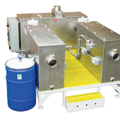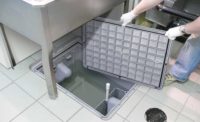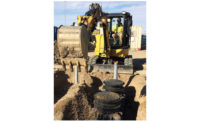
In November 2011, an historic hotel in Dallas announced a $78 million renovation and expansion project with plans to extend the property to a near-full city block. The hotel owners’ plan, according to a local business journal report, included adding 31 guest rooms, suites, penthouses and a new high-end restaurant.
More kitchen space meant the hotel’s grease interceptor capacity had to be enhanced. Previously, the hotel used old-style grease traps, but now the hotel called for approximately 100 fixtures to feed into the automatic grease interceptors. Enter Jeff Harper and Carrollton, Texas-based Brandt Services. Harper and company were called to install two new Highland Tank automatic grease interceptors so the new 177,000-sq.-ft. facility - which covers five buildings including three buildings built around 1915 - would be fully code-compliant.
“It was an interesting project,” says Harper, a project engineer for Brandt Services.
The hotel wasn’t able to install exterior interceptors because of underground utilities and property lines. So in a sub-basement in the three-story building next to the 10-story hotel, the crew set up the application. Harper was pleased with how much room his crew had to operate with when installing the system.
“We had some fairly large openings,” he says.
Harper adds the Highland Tank Grease-Stopper automatic grease interceptors were easier to install thanks in part to the manufacturer’s willingness to adjust the interceptor to the specific needs of the application.
The piping features a simple inlet and outlet setup with the outlet dumping grease into two 55-gal. barrels, which hotel employees (or a company outsourced by the hotel) will have to remove - potentially daily - depending on how much the kitchens are in use.
The system is made up of a distribution tank sized so it receives the flow from all kitchen fixtures. It also has a solids interceptor and disc-drive motors, which evenly divert the flow through gravity to the two parallel 100-gpm interceptors.
Kitchen appliances pipe to the outlet and the graywater is sent into the system to be dumped into the barrels. The interceptors heat and remove the trapped grease at a rate of 40 lb./hr. The system incorporates a Highland Tank Diskimmer, an electrical grease-skimming device that wipes grease from the surface with special blades into the barrels. The barrels are also set with a high-level alarm, which alerts staff that the grease is ready to be removed. In accordance with OSHA regulations, approved steps, a platform and other accessories such as gate valves, were installed for easy maintenance and operation.
“It was a simple install. We just had to modify some piping connections,” Harper says. “(Highland Tank) worked with us with that. It’s an easier piece of equipment to work with.”
Having the system located in a sub-basement does come with some challenges. Workers have to bring down an empty barrel and bring up a full 55-gal. barrel for removal.
“Because of the position, it can be difficult to get it up to ground level and get rid of the removed grease,” Harper states.
But overall, Harper feels the hotel is now better equipped to handle its increased grease load. Harper adds maintenance on the interceptors will be easier.
“It’s a gravity-fit system with no pumps involved,” he says. “It’s also a simple startup for us. We’re happy with that. Anything that saves time on our end is appreciated.”


